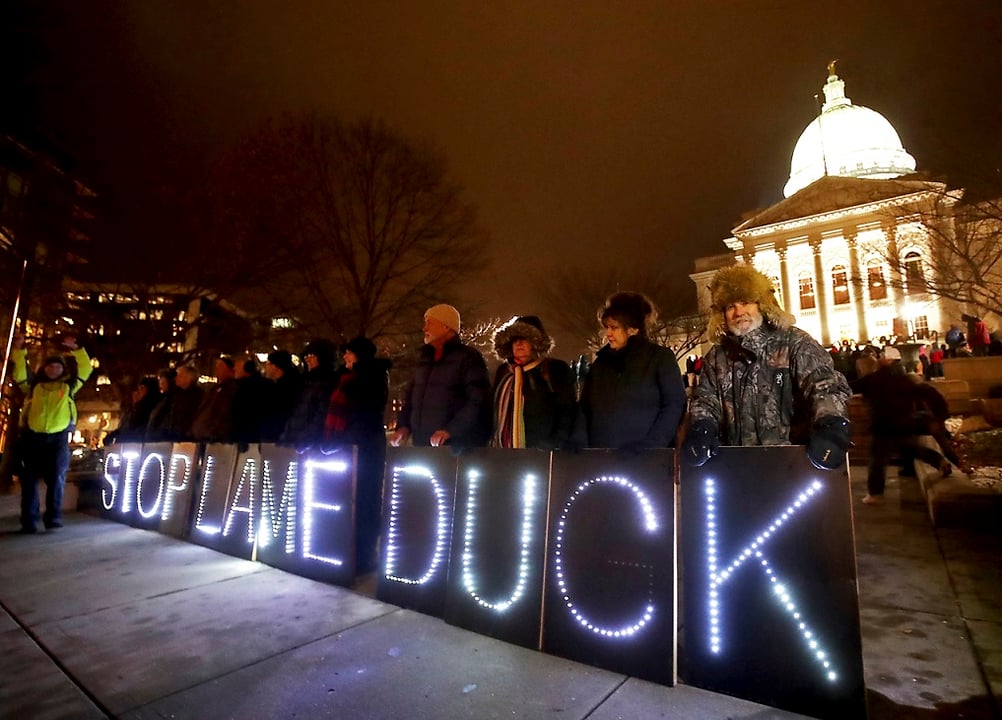MADISON, Wis. (CN) – A Wisconsin judge on Thursday temporarily blocked three controversial laws passed during a December lame-duck session in the GOP-controlled Legislature aimed at limiting the powers of the new Democratic governor and attorney general.

Dane County Circuit Judge Richard Niess issued a temporary injunction against the laws, finding the Legislature did not meet lawfully when it quickly convened for an extraordinary floor session weeks after the election of Democratic Governor Tony Evers and Attorney General Josh Kaul, whose authority the legislation targeted.
The underlying lawsuit, filed in January by The League of Women Voters of Wisconsin, Disability Rights Wisconsin and Black Leaders Organizing for Communities, argued the GOP-organized lame-duck session overextended the powers of the Legislature and violated the Wisconsin Constitution.
The provisions at issue gave the Legislature the power to appoint board members and restrict the governor’s ability to appoint the chief executive to the Wisconsin Economic Development Corporation, or WEDC, a public-private jobs agency formed during former Governor Scott Walker’s tenure.
The new measures also gave state lawmakers broad oversight power over moves the governor could make on future health care waivers.
In addition, the laws implemented drug testing and minimum work requirements for some recipients of welfare such as food stamps, as well as a statewide two-week limit on early voting.
Judge Niess’ 16-page order Thursday denies the Legislature’s motion to dismiss and grants a temporary injunction enjoining enforcement of the lame-ducks laws, also denying the Legislature’s motion for a temporary stay of his order.
“Two immutable principles of our constitutional democracy command the result in this case: (1) the Wisconsin Constitution is the supreme law in Wisconsin on state matters, and (2) both the Constitution and the state statutes must be construed as written, not how the Legislature wishes they had been written,” the judge wrote.
The ruling states that the December 2018 extraordinary legislative session “transgresses both principles.”
“By meeting…without statutory authority, the Legislature has thwarted the peoples’ constitutional constraints on legislative action, the results of which cannot stand,” Niess wrote.
The order comes only three days after the parties and their counsel met for oral arguments in front of a full Dane County courtroom.
In a joint statement, Assembly Speaker Robin Vos, R- Rochester, and Senate Majority Leader Scott Fitzgerald, R- Juneau, considered the chief architects of the legislation, said that for decades “the Legislature has used extraordinary sessions that have been widely supported by members of both parties.
“The most recent extraordinary session was held for Governor Evers’ budget address,” they said. “Today’s ruling only creates chaos and will surely raise questions about items passed during previous extraordinary sessions, including stronger laws against child sexual predators and drunk drivers.”
“We will appeal this ruling,” the Republicans vowed.
The lawsuit at hand is one of a handful challenging the lame-duck session and legislation. The plaintiffs claim the GOP coalition responsible for crafting the bills and passing them in an all-night session did so beyond its own authority. Their ire was particularly focused on limits to early voting that the groups said unfairly target the densely populated, Democratic-leaning urban areas of the Badger State, like Madison and Milwaukee.
Governor Evers said Thursday that the ruling “is a victory for the people of Wisconsin and for preserving the Wisconsin Constitution.”
“The Legislature overplayed its hand by using an unlawful process to accumulate more power for itself and override the will of the people, despite the outcome of last November’s election,” Evers said in a statement. “I look forward to putting this disappointing chapter behind us so we can move forward together to put the needs of the people of Wisconsin first.”
In light of Judge Niess’ order, Attorney General Kaul said his office is seeking to withdraw Wisconsin from a Texas-led lawsuit challenging the constitutionality of the Affordable Care Act, better known as Obamacare.
Kaul and Evers campaigned on withdrawing the state from that legal action, but were previously blocked from doing so by provisions in the lame-duck legislation.
Thursday’s order also vacates 82 appointments made by former Governor Walker, a Republican, that were confirmed during December’s extraordinary session, giving Evers the opportunity to fill those appointments, including key ones on the University of Wisconsin System’s Board of Regents and Public Service Commission.
Another of the four lawsuits filed over the lame-duck laws has a hearing set for Monday in Madison. That complaint was filed by local unions.
Subscribe to Closing Arguments
Sign up for new weekly newsletter Closing Arguments to get the latest about ongoing trials, major litigation and hot cases and rulings in courthouses around the U.S. and the world.








